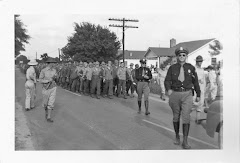
At left is a photo of Werner Meier, a sergeant (Feldwebel) in the Luftwaffe, who flew a Stuka Junkers 87 bomber in France and Russia before being sent to serve with German ground forces in North Africa. He was captured in early May 1943 and became one of the first 600 POWs sent to Camp Aliceville in Alabama. He spent almost a year in Aliceville and then was sent to Camp Sutton in North Carolina, where records show he was shot and killed on July 11, 1944, while trying to leave the camp. He was buried with military honors at Camp Buttner on July 13.
My friend and correspondent Gunther Wening, a relative of Meier's who lives in Holland, sent the above photo and other information while I was working on Guests Behind the Barbed Wire. This week Gunther sent me copies of two newspaper articles, written by Louise Pettus, that appeared in Carolina Gateway. Read together, the two articles add some puzzling details to the brief mention of Werner Meier in my book.
Pettus wrote that, during WWII, a man named Robert Vaughan drove a truck that was outfitted with benches and covered on top. It picked up POWs from Camp Sutton and took them to a farm near the village of Van Wyck that was owned by a Mr. Sachenmaer who owned a hosiery mill in Charlotte. One of his sons remembers the POWs tossing small bags of candy and gum to the local children. One POW gave Vaughan a handcarved replica of the ship that had brought him to America.
A man named David Alexander says a relative named Glenn Alexander, the farm manager at that time, told him it was prisoners who pointed out Werner Meier walking on the road--walking toward the work area, not away from it. Guards were patrolling the road in a Jeep. They fired twice, and Meier was killed. Mr. Alexander always believed Meier was trying to return to the camp, not run away from it.
A woman named Betty Broome, who was ten years old at that time, says she remembers being told that the prisoner had tried to escape, but she didn't think that made sense because he didn't know anyone in the area and didn't have any place to go.
Meier's relative, Gunther Wening, teaches German to students in Holland. He is thinking about writing short articles about World War II in his own region in Holland. He had this comment about the newspaper articles he sent:
"I am really astonished by the circumstances of Werner's death. Until now, everybody in the family had a picture in their mind of a fleeing and running away Werner Meier, who gets shot. I can hardly believe that somebody gets shot dead who walks on a street. I have been a soldier myself and can't understand why they shot immediately and there was something like a warning shot, but then again, I don't know the instructions the guards had and the exact situation."
If any of my readers would like copies of the two newspaper articles, please send me a comment with your e-mail or snail mail address, and I will send them along. If anyone has additional information about Werner Meier or about the circumstances of his death, please share that.







